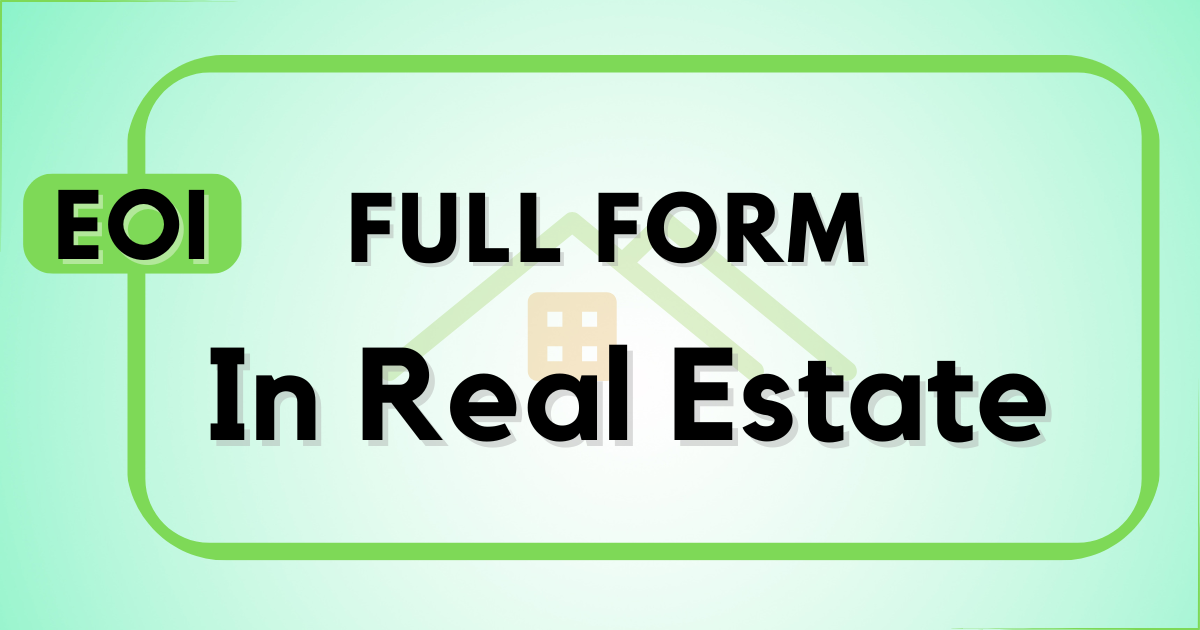EOI has become an important term in real estate. But what does it mean, and why is it important for you? Let’s find out.
Meaning of EOI
The full form of EOI is Expression of Interest. It is a formal process. Potential buyers or investors are interested in a specific property.
Uses of EOI in Real Estate
In real estate, EOI is used in several ways:
For new projects: Developers use EOI to express interest from potential buyers. It helps them assess the demand for the project.
For specific properties, sellers can use EOI to invite buyers to show interest in them.
For investment opportunities: Investors use EOI to express interest from potential investors.
How does the EOI process work?
The EOI process generally consists of the following steps:
EOI invitation: The developer or seller issues an EOI invitation. It includes property details, important dates, and the EOI submission process.
EOI submission: Interested buyers or investors fill out and submit an EOI form. This may include: 1. Interest in the property; 2. Contact details; 3. Proof of financial eligibility.
EOI evaluation: The developer or seller reviews the EOI. They then shortlist potential buyers or investors.
Next, invite the shortlisted buyers to visit the property and submit detailed offers.
Advantages of EOI
The EOI process has several advantages:
For developers and sellers:
- Helps to assess market demand.
- Helps to identify potential buyers or investors.
- Saves time and resources.
For buyers and investors:
- Provides an opportunity to express initial interest.
- Allows one to compete with other potential buyers or investors.
- Provides an opportunity to get more information about the property or investment opportunities.
Disadvantages of EOI
Although the EOI process has many advantages, it also has some disadvantages:
- Uncertainty: There is often uncertainty in the EOI process, as it is not clear which EOI will be accepted.
- Time-consuming: The EOI process can be time-consuming, especially if many EOIs are received.
- No financial obligation: Submitting an EOI is free. This may make some buyers or investors seem unserious.
Some important things about EOI
- Before submitting an EOI, you must get all info about the property or investment.
- When submitting an EOI, it is important to provide correct and accurate information.
- During the EOI process, it’s vital to have an honest chat with the developer or seller.
- Before participating in the EOI process, it is always good to consult a lawyer or a financial adviser.
Is EOI a good option?
EOI can be a good option if you want to invest early in a new project and take advantage of pre-launch offers. But you should also keep in mind that the EOI process involves some risks. Before deciding, get all the info. Then, decide based on your financial plan.
Conclusion
EOI is a new trend in real estate, which offers many benefits to both developers and buyers. But you need to understand the EOI process and keep its risks in mind. If you join EOI, choose a reliable developer. Read all the paperwork carefully.
FAQs
-
What is an EOI in Real Estate? An EOI, or Expression of Interest, is a formal document. It shows a potential buyer’s or investor’s intent to buy a property or invest in a real estate project. It is frequently used by developers to determine interest in new initiatives. Sellers use it to attract potential buyers.
-
How does the EOI process work? The EOI process typically involves the following steps:
-
EOI Invitation: The developer or seller issues an EOI invitation. It outlines the property details, key terms, and the EOI deadline.
-
EOI Submission: Interested parties must submit their EOIs. They may include a short introduction, proof of funds, and any requirements.
-
EOI Evaluation: The developer or seller will check the submitted EOIs. They will use criteria such as financial capability, experience, and proposed terms.
-
Shortlisting: Based on the evaluation, a shortlist of buyers is created.
-
The shortlisted parties negotiate and conduct due diligence to complete the deal.
-
-
What are the benefits of using EOI?
-
For Developers and Sellers:
-
Helps to gauge market interest and demand.
-
Identifies potential buyers or investors early on.
-
Streamline the sales process.
-
-
For Buyers and Investors:
-
Provides an opportunity to express interest early.
-
Allows for early negotiations and due diligence.
-
Can potentially secure favorable terms.
-
-
-
Is there a cost involved in submitting an EOI? In most cases, there is no direct cost associated with submitting an EOI. But note there may be indirect costs. These include legal and consultancy fees for a strong EOI.
-
What Happens After Submitting an EOI? After you submit an EOI, the developer or seller may contact you for more info. If you’re shortlisted, you may be invited to a detailed negotiation. This could include site visits, financial talks, and legal paperwork.
